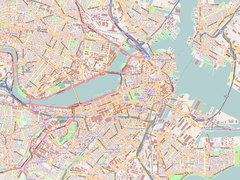Charlestown Bridge
| Charlestown Bridge | |
|---|---|

Charlestown Bridge, looking north. The red line on the pavement indicates the Freedom Trail.
|
|
| Coordinates | 42°22′08″N 71°03′36″W / 42.36889°N 71.06000°WCoordinates: 42°22′08″N 71°03′36″W / 42.36889°N 71.06000°W |
| Carries | North Washington Street |
| Crosses | Charles River |
| Locale | Boston, Massachusetts |
| Maintained by | City of Boston |
| Followed by | Charles River Bridge (1786) |
| Characteristics | |
| Design | Plate girder bridge approaches, with truss swing span |
| Total length | 1,089 ft (332 m) |
| Width | 66 ft (20 m) |
| No. of spans | One (241.2 ft (73.5 m)) |
| History | |
| Designer | William Jackson |
| Construction begin | 1898 |
| Construction end | 1900 |
| Opened | 1900 |
| Statistics | |
| Daily traffic | 38,400 cars/day (2010) |
The Charlestown Bridge (also called the North Washington Street Bridge) is located in Boston and spans the Charles River. As the river's easternmost crossing, the bridge connects the neighborhoods of Charlestown and the North End. Completed in 1900, the bridge carries a portion of the Freedom Trail linking to the USS Constitution and Bunker Hill. To the north, the Charlestown bridge connects to Rutherford Avenue; to the south it connects with North Washington Street. (With the pending renovation of the bridge anticipated to start in Autumn 2017, there has been discussion of changing the name of the bridge to the Cornelius F. Regan or Regan Bridge. This is in honor of patrolman Cornelius F. Regan, who was killed in the line of duty 1/13/1898. He died of injuries sustained while saving someone from drowning who jumped off the bridge into the Charles River.)
The first government-sanctioned ferry crossing of the Charles was chartered at this location in the 1630s. It was operated by various individuals until it was given to Harvard College "in perpetuity" in 1640, to support the college financially. In 1640, the Massachusetts General Court granted Harvard College the revenue from the Boston-Charlestown ferry to help support the institution. The Harvard Corporation in its capacity managed the Charlestown ferry from the 1640s until 1785, and after the completion of the Charles River Bridge in 1785.
The first bridge on this site was known as the Charles River Bridge, chartered in 1785 and opened on June 17, 1786. As a condition of chartering the bridge, a sum of £200 was paid annually to Harvard College to compensate for the lost ferry income. The bridge was privately built and operated, with tolls producing profits for the investors during the charter period, after the initial expense was paid off. In 1792, the West Boston Bridge was chartered, connecting West Boston to Cambridge. In compensation, the legislature extended the charter period of the Charles River Bridge by 30 years, but the unpopular double tolls on Sundays were eliminated. Traffic to the bridge was facilitated by the laying out of the Medford Turnpike in 1803.
...
Wikipedia


